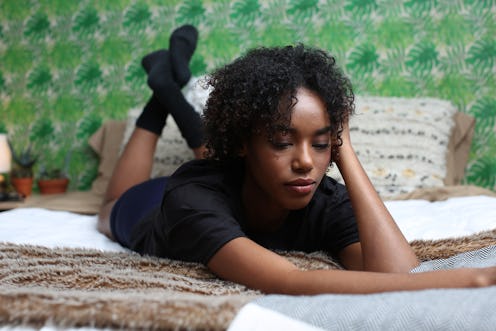
There's a lot of advice out there on how to combat insomnia. But what if you can't? How do you maintain your sanity when you're tossing and turning in bed for hours — or worse, when you've just woken up from a night spent tossing and turning? Obviously, that situation is not ideal, but it doesn't have to ruin your day — or your life.
"Insomnia can come from many places, and sometimes these overlap," Dr. Benjamin Smarr, Ph.D. in Neurobiology and Behavior at UC Berkeley and Reverie Sleep Expert, tells Bustle. "Usually one refers to insomnia when the sleeplessness is not caused by some other obvious cause, like side effects from medicine, anxiety, or bright lights and loud noises. The principle thing to do is notice how long it takes from when you want to go to sleep to when you get to sleep. If that is routinely a long time, or if you wake frequently and for many days in a row, then it’s worth speaking with a sleep specialist."
There are many ways to treat insomnia, from cognitive behavioral therapy to magnesium and 5-HTP supplements. But these treatments don't always work every night, and you may find yourself needing to do damage control during or after a terrible night's sleep. Here's how to stop insomnia from getting in the way of your work, relationships, and life.
1
Occupy Yourself
Obviously, you want to try to get to sleep. But if it's not working, lying there with your thoughts is going to make you more anxious, Chris Brantner, Certified Sleep Science Coach at SleepZoo.com, tells Bustle. And the more you lie in bed stressing out, the more you'll associate your bed with stress, which will make it harder to sleep, says Smarr.
"Instead, get up and do something," Brantner advises. "Just make sure it's not something that will amp you up. Do something in soft, dim light that's perhaps boring and monotonous. And make sure it doesn't involve a screen. Maybe read a book, fold laundry, etc." Smarr recommends doing this in a different room if you can. Once you've gotten tired out from this activity, give sleeping another try, and it might be easier.
2
Get Sunlight
"Getting in the daylight naturally energizes you and helps you wake up," Brantner says. "And there's something about the sun that just makes you feel better. Not only that, it can have the additional benefit of resetting your circadian rhythm, which could help with the following night's sleep." So, try to get outside as soon as possible the day after a crappy night's sleep, and take breaks to go outside as much as you can.
3
Exercise In The Morning
When your head is hurting and you can barely open your eyes, working out may be the last thing on your mind — but it's also one of the most helpful things you can do to wake up. "A morning workout is a good way to get the blood flowing, get endorphins flowing, and give you a morning boost," says Bratner. "Whether you got good sleep or not, it's a good idea to push through and start the day off right."
4
Take A Short Nap
Napping for around half an hour can help get you through the day after a sleepless night, says Bratner. Just make sure not to sleep more than that, or else falling asleep the following night may be even harder.
5
Don't Look At The Clock
"You want to avoid the feeling of waking up in the middle of the night and looking at the clock, which just adds stress to the fact that you can’t sleep," says Bratner. To avoid the temptation to do this, hide any visible clock faces in your room and put turn your phone so that the screen is facing down (which you should be doing anyway so that the light doesn't wake you up).
6
Remind Yourself That At Least You're Resting
"A lot of insomnia cases are made worse by the anxiety of needing to fall asleep," says Brantner. "It's why sleep trackers can cripple some people into not being able to sleep." To avoid the downward spiral of worrying about your insomnia (and getting more insomnia as a result), remind yourself that even if you don't sleep, you're resting, and that in of itself is valuable.
7
Tell Yourself It Will Get Better
Brantner also suggests feeding yourself positive mantras throughout the day. For instance, if you're able to work out that day, tell yourself, "now I can feel recharged," he says. Or, if you feel like you're barely hanging in there, tell yourself, "I can make it to my nap this afternoon."
But Brantner says there really is no adequate substitute for good sleep. "I'd recommend anyone dealing with insomnia take a serious look at their sleep hygiene and their bedtime routines and do their best to create every possible opportunity for quality sleep," he says.